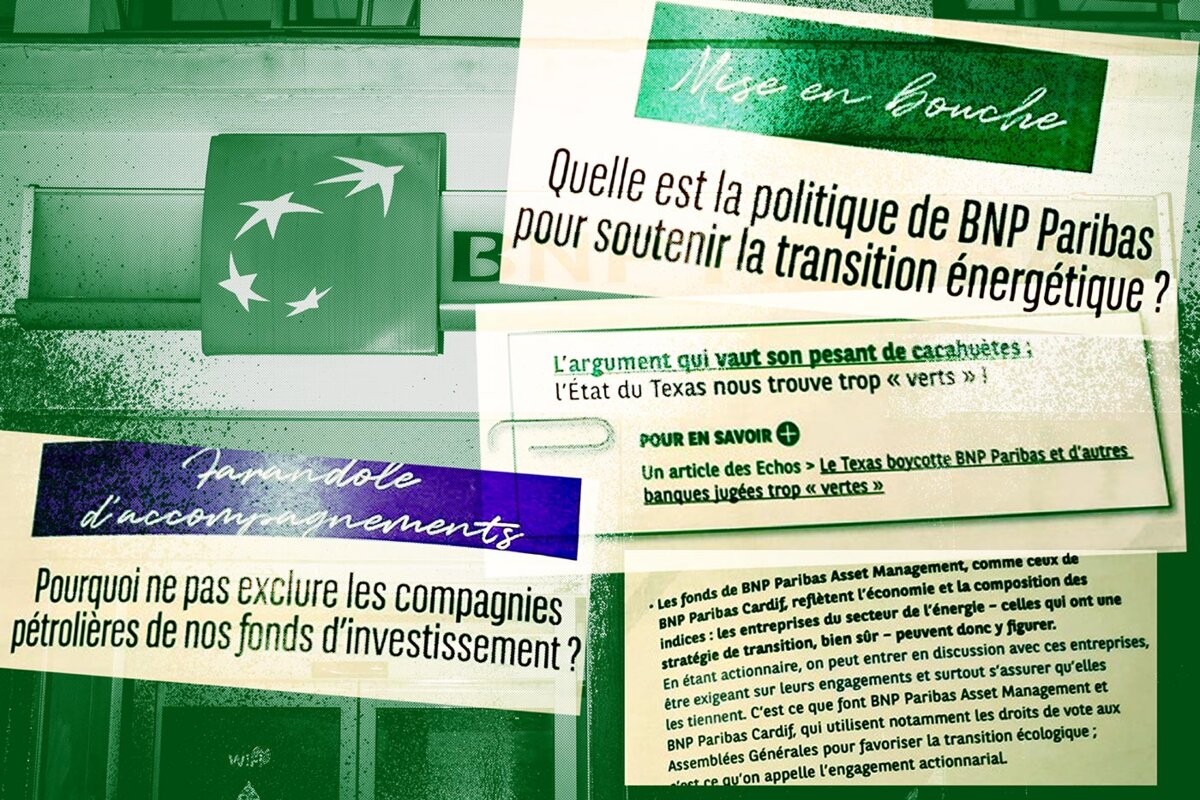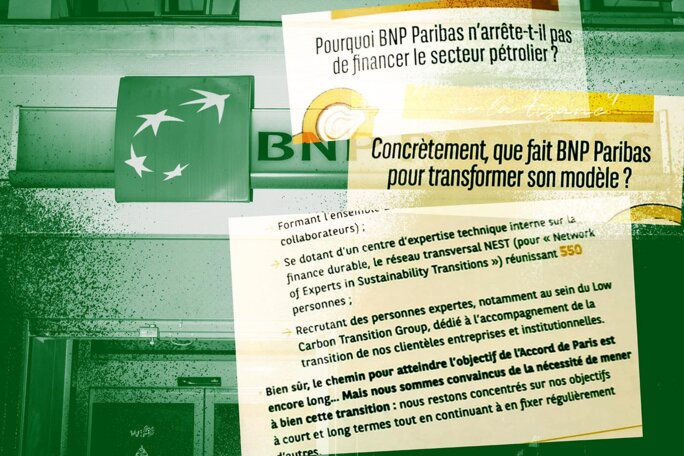While French oil and gas giant TotalEnergies earlier this year produced a pamphlet for its employees on how to present the group in a positive light at dinner-table discussions with family and friends, Mediapart can reveal that French banking group BNP Paribas has also taken the meal-time theme with a manual advising staff on how best to respond to relatives who are “sceptical” about its role in funding activities that are fuelling climate change.
BNP Paribas, which is British oil company Shell’s principal bank, and the second financial services provider for TotalEnergies, is increasingly under fire from environmental NGOs and climate activists over its position among European banks as the largest financial investor in oil and gas companies, whose fossil fuels are driving global warming.
Campaigners have led high-profile actions against the bank, such as loudly interrupting its annual general meeting in Paris last October and regularly painting over its cash dispensers. The bank, however, insists that “supporting our societies and economies towards net-zero is indeed a priority for BNP Paribas”.
Mediapart has obtained the internal document it sent out to staff in March on how, at “the next family meal”, to explain to a “cousin worried about climate-warming” or a “sister-in-law who is sceptical about the financial sector’s actions” that the bank in fact supports the ending of mass fossil fuel extraction.

Enlargement : Illustration 1

While TotalEnergies entitled its similar internal document “An almost perfect dinner”, (borrowing the name of the French spin-off of the British TV ‘reality series’ Come Dine with Me), BNP Paribas presents a manual of ready-made arguments beginning with a double-page spread entitled “mise en bouche” (appetizer). This includes how to answer the question, “What is the policy of BNP Paribas for supporting energy transition?” To which the bank advises its staff to begin by reminding the questioner that “we have depended upon fossil fuels for the past 200 years” and that “passing from one world to another cannot be done in one day”.
The BNP Paribas communications team add the punchline that the bank “funds low-carbon energy more than fossil fuels”.
But that, to continue with the culinary metaphors, would surely be enough for Lucie Pinson, director of Reclaim Finance, an NGO promoting a movement of disinvestment in fossil fuels, to lose her appetite. “BNP Paribas does not inherit from a society that is dependent upon fossil fuels,” she told Mediapart. “It has an historic responsibility because it has actively constructed it by financing, since long ago, the sector’s industrialists.”
“According to the Bloomberg financial medium, for every 1.69 euros injected into so-called low carbon energy, BNP Paribas adds one euro into fossil fuels,” Pinson added. It is a ratio that means the bank is still not aligned to a trajectory aimed at limiting global warming to an increase of less than 1.5° Celsius.
In its internal document, set out on glazed paper, the bank proposes handy phrases for countering criticism that among European banks it is the leading financier of fossil fuel production. This includes the observation that in 2022, it was ranked “world number one for the structuring and investment of green bonds” and that “18 billion euros were dedicated to it”.
But the bank’s definition of “green” is, at the least, questionable. For example, among these bonds stamped with green credentials is one for the funding of a runway extension at Hong Kong’s international airport. The bank’s document also avoids mentioning the fact that, between 2021 and 2022, and in parallel to its support elsewhere for low-carbon economic activity, BNP Paribas is one of the rare banks to have increased its financial support of the fossil fuel sector.

Enlargement : Illustration 2

Four pages of its internal what-to-say guide, entitled “selection of accompaniments” and “main dish”, deal with the financing of oil production, and argues that, “fully engaged in a movement for exiting oil”, the bank “grants no further funding for projects to develop new oil fields”.
The problem with that assertion is that while BNP Paribas has indeed stopped any further direct financing of new oil and gas infrastructures, it continues to lend financial support to energy companies which have the capacity to develop those very same projects, on the grounds that they have adopted plans for energy transition.
The industrial giants who are clients of the French bank are in fact far from enacting plans that meet the urgency of climate change, and continue to develop oil and gas fields. A case in point is TotalEnergies, whose “sustainability and climate” strategy, approved at its annual general meeting in May, includes the provision that 70% of its investment spending will be on oil and gas activities up until 2030. In 2022, around 20 new projects for fossil fuel extraction were, variously, announced, launched, or extended by the energy giant.
In its guide for staff, BNP Paribas details only its loans activity. However, it also offers other banking services like bond issues – whereby bonds are bought from the issuer and resold to investors – and which can represent up to a half of the direct financing received by fossil fuel companies.
Since the 2015 Paris Climate Accords, the bank has ploughed 64.2 billion dollars into the financing of companies developing oil and gas production, and in 2022 alone that financing totalled 5.5 billion dollars.
All of which runs counter-current to the recommendations of scientists who call for a decrease of 4% in oil production and 3% in gas production between now and 2030 in order to contain the rise in global warming to 1.5° Celsius. Since 2021, the inter-governmental International Energy Agency has advocated an immediate halt to all new oil and gas extraction projects in face of the climate change emergency.
“A company cannot say it’s engaged in support of the climate and at the same time support the expansion of fossil fuels,” said Lucie Pinson, commenting on the BNP Paribas what-to-say guide. “It’s a manual clearly written against criticism from civil society, but also a guide aimed at reassuring staff who must increasingly question themselves as to the credibility of their group.”
In February, around 600 scientists, including co-authors of studies by the Intergovernmental Panel on Climate Change, published an open letter in which they urged the board of directors of BNP Paribas to end all financial support for the opening of new oil and gas fields. Also in February, Oxfam France, Friends of the Earth France and the French association dedicated to climate change issues, Notre affaire à tous, filed a formal complaint against the bank over its responsibility in fuelling climate change – the first such legal move worldwide to be made against a commercial bank.
BNP Paribas continues to insist that it is “the bank of a changing world”, and its financing activities demonstrate that it is indeed the bank of a world on fire.
-------------------------
- The original French version of this report can be found here.
English version by Graham Tearse


